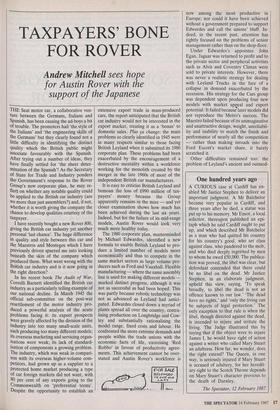One hundred years ago
A CURIOUS case at Cardiff has en- abled Mr Justice Stephen to deliver an important judgment. A Mr Batchelor became very popular in Cardiff, and three years after he died, a statue was put up to his memory. Mr Ensor, a local solicitor, thereupon published an epi- taph which he said Cardiff ought to put up, and which described Mr Batchelor as a man who had quitted his country for his country's good, who set class against class, who pandered to the mob, and who died deeply regretted by men to whom he owed £50,000. The publica- tion was proved, the libel was clear, but defendant contended that there could be no libel on the dead. Mr Justice Stephen, in an elaborate judgment, upheld this view, saying, 'To speak broadly, to libel the dead is not an offence known to our law.' The dead have no rights,' and 'only the living can be subjects of legal protection.' The only exception to that rule is when the libel, though directed against the dead, is intended to injure and irritate the living. The Judge illustrated this by saying that if the object were to injure James I, he would have right of action against a writer who called Mary Stuart an adultress. How far, we wonder, does the right extend? The Queen, in one way, is seriously injured if Mary Stuart is accused of adultery, for her heredit- ary right to the Scotch Throne depends on Mary Stuart's character previous to the death of Darnley.
The Spectator, 12 February 1887


























































 Previous page
Previous page